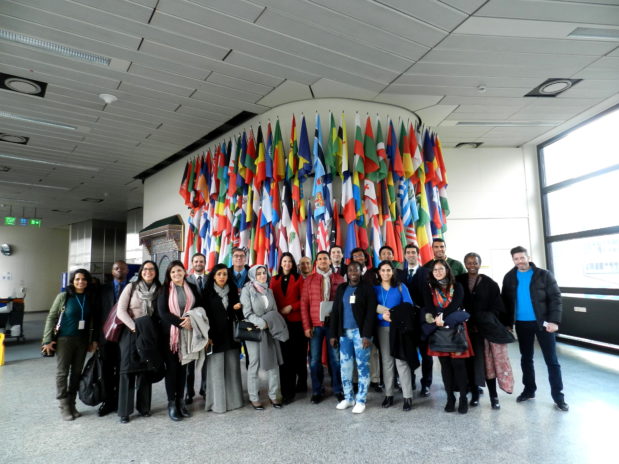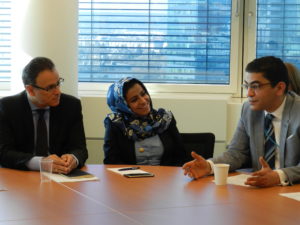
The VCDNP and the James Martin Center for Nonproliferation Studies (CNS) organized its fifteenth bi-annual intensive short course on nuclear non-proliferation and disarmament in Vienna, Austria, from 19 to 23 March 2018. The course brought together a range of experts from the international organizations in Vienna and academia to share their professional knowledge and experience with the participants. Course participants represented 25 States from Africa, South East Asia, Central Asia, the Middle East, the Americas and Europe, with many coming from their national capitals or representing their State missions in Vienna, New York or Geneva. Women made up 52 percent of the participants and 50 percent of lecturers and guest speakers.

The one-week intensive course covered the three main pillars of the nuclear non-proliferation regime, its history, evolution, constituent elements and current status. Emphasis was placed on the profound understanding of the political, legal and technical elements within the nuclear field. The functions of the nuclear non-proliferation regime were explained through provided lectures focused on the Treaty on the Non-Proliferation of Nuclear Weapons (NPT) and its review process; the International Atomic Energy Agency (IAEA) and its implementation of safeguards; and the Comprehensive Nuclear-Test-Ban Treaty (CTBT) and its verification system. The course also examined recent case studies, analyzing the missile programme of the Democratic People’s Republic of Korea and discussing future prospects for the Joint Comprehensive Plan of Action. Participants were also exposed to theoretical concepts of nuclear weapons strategy, arms control and their practical applications. In addition, the course discussed the history and current status of export control regimes, while also addressing the threats posed by illicit nuclear trade. Moreover, participants were provided with a deep understanding of the concepts of nuclear security and their implementation in practice. Participants were given the chance to interact with experts, ask questions and give comments both during and after the lectures. Another added value was that the participants could interact with each other, share their knowledge and learn from one another both during the lectures and breaks.
 As the course also aims to provide the participants with more practical insights into the work and activities of the international organizations in Vienna, a half day field trip was organized to the Vienna International Centre. Course participants were given the opportunity to visit the IAEA Safeguards Laboratory and the Incident and Emergency Centre. The visit to the IAEA was followed by a visit to the Comprehensive Nuclear-Test-Ban Treaty Organization’s (CTBTO) International Data Centre where participants could see first-hand the work of the CTBTO’s International Monitoring System, which is responsible for detecting nuclear explosions.
As the course also aims to provide the participants with more practical insights into the work and activities of the international organizations in Vienna, a half day field trip was organized to the Vienna International Centre. Course participants were given the opportunity to visit the IAEA Safeguards Laboratory and the Incident and Emergency Centre. The visit to the IAEA was followed by a visit to the Comprehensive Nuclear-Test-Ban Treaty Organization’s (CTBTO) International Data Centre where participants could see first-hand the work of the CTBTO’s International Monitoring System, which is responsible for detecting nuclear explosions.
A number of experts and senior officials from the Vienna-based international organizations and missions gave presentations at the course, including Jasmin Craufurd-Hill (Institute for Regional Security), Thomas Markram (UN Office for Disarmament Affairs), Sandra Munoz (IAEA), Dmitriy Nikonov (IAEA), Julia Peitl (Austria’s Ministry of Foreign Affairs), and Bozorgmehr (Reza) Ziaran (CTBTO). The VCDNP and CNS lecturers were Andrea Berger (CNS), Catherine Dill (CNS), Ulrich Kuehn (VCDNP), Dr. William Potter (CNS), Laura Rockwood (VCDNP), and Ian Stewart (VCDNP/King’s College).
View the course agenda here.
The timing of the course, convening just one month before the 2018 Preparatory Committee for the 2020 Nuclear Non-Proliferation Treaty Review Conference (RevCon), provided participants with an opportunity to attend a panel discussion entitled “Issues and Prospects for the 2018 NPT PrepCom Session” which was held on 23 March 2018. The main issues discussed by the chairman of the Preparatory Committee, Ambassador Adam Bugajski, and the other panelists included the prospects, objectives and challenges for the upcoming meeting and possible implications for the 2020 NPT Review Conference.
 The VCDNP also encourages participants to interact and share their professional experiences with each other. To fulfil this purpose the Center also engaged course alumni in the program. A roundtable discussion with three Vienna-based former course participants offered a different point of view on how multilateral debates are conducted and the kind of issues diplomats are confronted with when it comes to nuclear disarmament and non-proliferation negotiations.
The VCDNP also encourages participants to interact and share their professional experiences with each other. To fulfil this purpose the Center also engaged course alumni in the program. A roundtable discussion with three Vienna-based former course participants offered a different point of view on how multilateral debates are conducted and the kind of issues diplomats are confronted with when it comes to nuclear disarmament and non-proliferation negotiations.
During the course, participants were asked to implement their newly gained knowledge in a group activity where they were tasked with negotiating consensus language on key issues within the three Main Committees (nuclear disarmament, nuclear non-proliferation and peaceful uses of nuclear energy) of the NPT RevCon. Participants were divided into three groups, each representing one of the Main Committees. At the end of the day each group presented the results of their work, before being challenged and asked questions by their peers. The activity helped course participants gain a better understanding of the practicality of the non-proliferation regime and to think ahead toward the 2020 NPT RevCon.
At the end of the course, participants completed an anonymous evaluation where they could assess different aspects of the short course and provide suggestions for improvement. Overall, participants were very satisfied with the structure of the course and stressed their appreciation for the level of expertise of the presenters. Below are some of the comments provided by the participants (quoted as written):
“I believe that the VCDNP is the best place to get acquainted with the issue of international nuclear non-proliferation and disarmament.”
“The course succeed in presenting a cohesive and broad perspective that helps to better understand the nuclear non-proliferation and disarmament panorama. It was very useful to organize the previous knowledge of these issues.”“The course [provided] extra tools for analysis of the non-proliferation issues which will help me to perform better in the multilateral arena.”
“It [the short course] covers a wide range of the issues related to the subject matter, and [I liked] that the lectures were given by experts with profound command of their field.”
The VCDNP extends its gratitude to the Carnegie Corporation of New York and the John D. and Catherine T. MacArthur Foundation for its generous support that made this course possible.